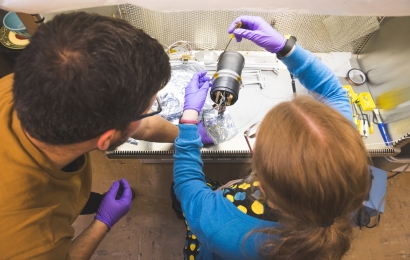
Exploring the Future of Research
Discover the Stories Behind Dartmouth’s World-Class Scholarship
A member of the Ivy League, Dartmouth is proud to claim its place as one of America’s leading research universities, deepening and advancing our understanding of the world. We leverage the tightly woven fabric of our academic community and proximity of our graduate schools and resources to create new interdisciplinary approaches to solving complex problems—encouraging the exchange of ideas across fields of study and building unique partnerships. Our state-of-the-art research centers and institutes focus on critical fields such as energy, environmental sustainability, health care, artificial intelligence, social sciences, and more. With our rich history of innovation and commitment to academic excellence, we have fostered a culture of curiosity, tenacity, and collaboration.
Research Awards & Recognition
Get a glimpse of our commitment to cutting-edge research through some of our diverse discoveries:

Pioneering technology developed by Dartmouth scientists, led by Jason McLellan and a team at the Geisel School of Medicine in collaboration with the Scripps Research Institute and the National Institute for Allergy and Infectious Diseases, played a vital role in COVID-19 vaccine development and is now propelling Dartmouth into major investments for advancing research and education.

Are we entering the “climate-ball” era in baseball? A recent study from Dartmouth suggests rising temperatures due to global warming are contributing to more home runs. A report in the Bulletin of the American Meteorological Society shows that 500 home runs since 2010 can be attributed to increased temperatures from climate change.

A Dartmouth study published in Science Advances challenges the idea that YouTube’s recommendations algorithm is driving users to encounter extremist and alternative video channels. Instead, the study revealed the consumption of such content is primarily due to a small group of users with high levels of gender and racial resentment who actively subscribe to and seek out this content. The findings underscore the complexity of addressing problematic content on YouTube and call for a more nuanced approach to the issue.

